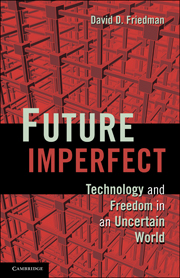Book contents
16 - Mind Drugs
Published online by Cambridge University Press: 18 August 2009
Summary
BETTER LIVING THROUGH CHEMISTRY
At least since the discovery of alcohol, humans have used drugs to affect the mind. As we learn more about how the mind works and become more skilled at chemical synthesis, we can expect to get better at it. In many ways this will be a good thing; already drugs provide substantial benefits to some sufferers from mental disorders. But, like most new technologies, improved mind drugs are also likely to raise new legal, social, and personal problems.
For the purposes of this chapter, it will be useful to consider four different classes of mind drugs: pleasure, performance, personality, control. Some drugs will fit into more than one category, reflecting multiple reasons why they are used.
Consider the familiar case of alcohol. Some people drink it because they like how it makes them feel – pleasure. Some drink it because they believe that it improves their performance; one acquaintance, as a college student, routinely had half a can of beer before an exam. Some drink it because it provides a temporary change in their personality that they sometimes desire. And some people feed alcohol to others, sometimes without their knowledge, as a crude way of controlling them.
Pleasure and Happiness
How might an everlasting-happiness drug – a drug which (implausibly!) left someone who tried it once living happily-ever-after – find itself described in the literature?
Substance x induces severe, irreversible structural damage to neurotransmitter subsystem y. Its sequelae include mood-congruent cognitive delusions, treatment-resistant euphoria, and toxic affective psychosis.
www.biopsychiatry.com/- Type
- Chapter
- Information
- Future ImperfectTechnology and Freedom in an Uncertain World, pp. 227 - 246Publisher: Cambridge University PressPrint publication year: 2008

